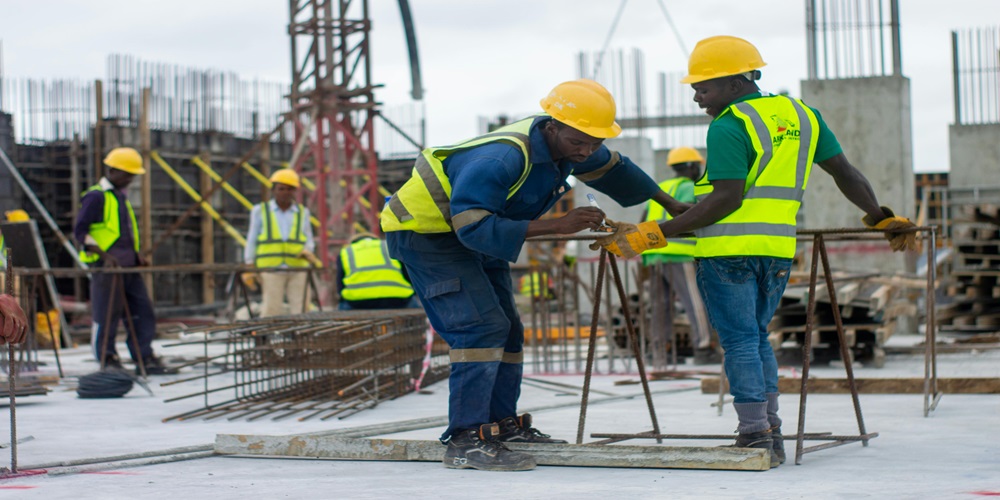Are you ready to build a successful career in the construction industry? Whether you’re just starting out or looking to advance your skills, being a construction laborer is an essential role on any job site. From mastering basic tools and techniques to understanding safety protocols and regulations, this comprehensive guide will equip you with everything you need to know to thrive in this dynamic and rewarding field. Let’s dig in!
Why Construction Labor is Essential
Welcome to the exciting world of construction laborers! Have you ever wondered what it takes to be a crucial part of building our cities, homes, and infrastructure? If you’re ready to get your hands dirty (literally!) and play a vital role in constructing the world around us, then keep reading. In this essential guide, we’ll explore everything you need to know about being a construction laborer – from education requirements to job outlook and safety tips. Let’s dig in!
What is a Construction Laborer?
In the world of construction, a construction laborer plays a crucial role in bringing projects to life. They are the backbone of any building site, working tirelessly to ensure that tasks are completed efficiently and safely. These hardworking individuals perform a variety of manual tasks such as digging trenches, operating machinery, and carrying materials.
Construction laborers work under the supervision of more experienced workers like foremen or contractors. They assist with various aspects of construction projects, from preparing sites for work to cleaning up debris once the project is complete. This hands-on role requires physical strength, stamina, and attention to detail.
While formal education is not always required to become a construction laborer, on-the-job training or apprenticeships are common. It’s essential for these workers to have good communication skills and be able to follow instructions accurately.
Education and Training Requirements
When it comes to becoming a construction laborer, formal education beyond high school is not always required. However, having a high school diploma or equivalent is typically preferred by employers. Some vocational schools and community colleges offer training programs specifically tailored for aspiring construction laborers.
These programs may cover topics such as safety regulations, blueprint reading, tool usage, and basic construction techniques. On-the-job training is also common in this field, where new hires learn from experienced workers while gaining hands-on experience.
In addition to formal education and on-the-job training, obtaining certifications in areas like Occupational Safety and Health Administration (OSHA) standards can enhance job prospects for construction laborers. Continuous learning and staying updated on industry trends are key to advancing in this field.”
Daily Responsibilities of a Construction Laborer
As a construction laborer, your daily responsibilities are diverse and essential to the success of any building project. You’ll often find yourself working alongside skilled tradespeople like carpenters, electricians, and plumbers, collaborating to bring a structure to life.
Your day may start with setting up and preparing the worksite by clearing debris, digging trenches, or mixing concrete. Attention to detail is key when measuring and cutting materials for installation. Whether it’s carrying heavy loads or operating machinery, physical stamina is crucial in this role.
You’ll assist in installing fixtures such as windows, doors, or cabinets while following safety protocols diligently. Cleaning up the site at the end of each day ensures a hazard-free environment for everyone on-site during construction.
Flexibility is vital as tasks can vary from day today; adaptability and teamwork will be your allies in meeting project deadlines efficiently.
Skills and Qualities Needed to Succeed as a Construction Laborer
To succeed as a construction laborer, it’s crucial to possess a mix of physical strength and stamina. The job often involves lifting heavy materials, digging trenches, and working in various weather conditions. Adaptability is key; being able to follow instructions from supervisors while also being resourceful when problem-solving on the job site.
Attention to detail is vital in ensuring that construction projects are completed accurately and safely. Communication skills play an important role in collaborating with team members and understanding project requirements. Additionally, having a strong work ethic and being dependable are qualities that will set you apart in this field.
Being safety-conscious at all times is non-negotiable for construction laborers. Prioritizing safe practices not only protects yourself but also your colleagues on the job site. A positive attitude towards learning new skills and techniques will keep you motivated to continually improve your craft as a valuable member of any construction team.
Work Environment and Conditions
Construction laborers work in a variety of environments, from building sites to road construction projects. These settings can be dynamic and ever-changing, requiring adaptability and flexibility. The work conditions for construction laborers can range from working outdoors in all weather conditions to indoor projects that may involve exposure to dust, fumes, and loud noises.
The physical demands of the job are significant, with tasks often involving heavy lifting, bending, kneeling, and standing for long periods. Safety precautions are crucial in this field due to the presence of potentially hazardous materials and equipment. Construction laborers must adhere to strict safety guidelines at all times to prevent accidents or injuries.
Despite the challenging environment they work in, construction laborers play a vital role in bringing various projects to life. Their hard work and dedication contribute significantly to the infrastructure development essential for society’s growth and progress.
Job Outlook and Salary Expectations
When it comes to the job outlook for construction laborers, the future looks promising. As the population grows and infrastructure continues to age, there will be a constant demand for skilled workers in this field. With new construction projects always on the horizon, opportunities for employment are expected to remain steady.
In terms of salary expectations, construction laborers can earn a decent income. The average pay varies depending on factors such as experience, location, and type of project. Entry-level positions may start at a lower wage but can increase with time and expertise. Specialized skills or certifications could also lead to higher-paying opportunities within the industry.
Safety Tips for Construction Laborers
As a construction laborer, safety should always be your top priority on the job site. Here are some essential tips to ensure you stay safe while working in this demanding field.
First and foremost, always wear the appropriate personal protective equipment (PPE) such as hard hats, steel-toed boots, gloves, and safety goggles. These items can help protect you from potential hazards like falling objects or debris.
Secondly, make sure to follow all safety protocols and procedures set forth by your employer. Attend any required safety training sessions and familiarize yourself with emergency procedures in case of accidents or incidents.
Additionally, be mindful of your surroundings at all times. Stay alert for potential hazards like uneven surfaces, heavy machinery operating nearby, or hazardous materials being used on-site.
Advancement Opportunities in the Field
Advancement opportunities in the field of construction labor offer a chance for growth and career development.
As you gain experience and skills in the industry, you may have the opportunity to take on more specialized roles within construction projects. This could include becoming a foreman, supervisor, or project manager.
By continuing your education and obtaining certifications in specific areas such as safety regulations or equipment operation, you can open doors to higher-paying positions with more responsibilities.
Networking with professionals in the industry can also lead to new opportunities for advancement. Building relationships with contractors, subcontractors, and other construction workers can help you learn about potential job openings or promotions.
Conclusion
Construction laborers play a vital role in the construction industry, helping to bring projects to life from start to finish. Their hard work, dedication, and skills are essential for creating safe and functional buildings and infrastructure that we rely on every day. As the backbone of the construction workforce, construction laborers deserve recognition for their contributions to society. So next time you pass by a construction site, take a moment to appreciate the hardworking individuals who make it all possible – our valuable construction laborers.



































